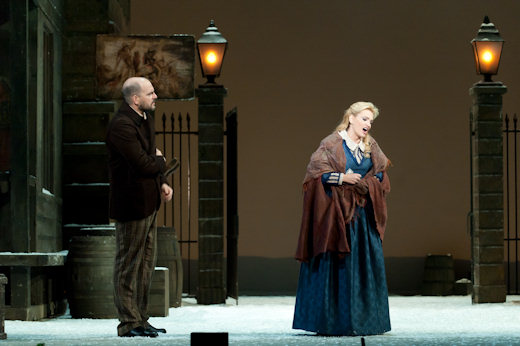Other Links
Editorial Board
- UK Editors
- Roger Jones and John Quinn
Editors for The Americas - Bruce Hodges and Jonathan Spencer Jones
European Editors - Bettina Mara and Jens F Laurson
Consulting Editor - Bill Kenny
Assistant Webmaster -Stan Metzger
Founder - Len Mullenger
Google Site Search
SEEN AND HEARD INTERNATIONAL OPERA REVIEW
Puccini, La Bohème:
Soloists, Real Orquesta Sinfónica de Sevilla, Coro de la A.A. del Teatro de la Maestranza. Conductor: Pedro Halffter. Teatro de la Maestranza 9 & 10.12.2010 (JMI)
Production: Royal Opera House Covent Garden
Direction: John Copley (Original)
Richard Gerard Jones (Revival)
Sets & Costumes: Julia Trevelyan
Lighting: John Charlton
Cast:
Mimi: Ainhoa Arteta/Carmela Remigio
Rodolfo: Massimo Giordano/Fernando Portari
Musetta: Beatriz Díaz/Tatiana Lisnic
Marcello: Juan Jesús Rodríguez/Claudio Sgura
Colline: Marco Vinco
Schaunard: Manel Esteve
Benoit/Alcindoro: Matteo Peirone
Juan Jesús Rodríguez
as Marcello and
Ainhoa Arteta
as Mimi

Picture Courtesy of the Teatro de la Maestranza
The Seville opera has put Puccini’s most popular opera on stage in a very traditional and classical production well known to London audiences, since it is John Copley’s from Covent Garden. Colin Clarke reviewed it for Seen and Heard at its last revival at the Royal Opera and you can read his impressions here. (Richard Gerard Jones oversaw the Seville revival.) The problem is: Good wines get better with time, not productions.
Not that matters were much better on the musical side. With the musical and artistic director of the theatre Pedro Halffter in the pit, the reading was patchy and lacked emotions. Halffter, it seems, isn’t particularly well suited to the Italian repertoire. The orchestra and chorus were average, at best... the kind of performance one might kindly call “solid”.
The biggest attraction for the public in this Bohème was the presence of Ainhoa Arteta as Mimi. Apart from Über-tenor Placido Domingo, Ainhoa Arteta has the greatest box office appeal in Spanish opera and she can fill theatres on the strength of her name alone. The evolution of this Basque soprano has been very interesting and even the most recalcitrant opera lovers recognize a singer worthy of admiration in her, well beyond the more superficial reasons of her popularity. Her performance was more dazzling than moving, although emotions came to the fore aplenty in the last two acts. In the second cast Italian Carmela Remigio took over from Mme. Arteta, who also proved a convincing Mimi. Her soprano hasn’t the scale of Arteta’s, but she is an excellent singer with only the handicap of a too wide vibrato throughout the whole range.
Italian tenor Massimo Giordano has a quality instrument and he projects it well, very much suited for Rodolfo. But his performance left something to be desired. From his first notes his voice did not seem to be in good condition, and problems were only increasing. Eventually he took refuge in a “canto di forza”, pushing his voice. A brief improvement at the beginning of the third Act didn’t mask that in the duet with Mimi he was unable to sing piano and had obvious pitch problems. Brazilian Fernando Portari was too light a tenor for Rodolfo, a part above his possibilities. His voice is not particularly beautiful, his singing monotonous, and pitch problems abounded.
Beatriz Diaz and Tatiana Lisnic shared the role of Musetta, both of them with a tiny vocal presence on stage. Miss Diaz hasn’t a beautiful timbre, but her voice carries well and she makes up for much by being an excellent actress. Tatiana Lisnic has a more appealing voice, but too small in size for Musetta. Spanish Juan Jesús Rodríguez an Italian Claudio Sgura were two excellent Marcellos. Mr. Rodríguez is the most important baritone in Spain, at least as long as Carlos Alvarez is not singing, and he lacks only a more brilliant top to be an internationally sought after baritone. Claudio Sgura is settling in to becoming a solid baritone. His middle range has not the quality of his Spanish colleague, but his top is better projected. Marco Vinco sang Colline’s aria with discriminating taste and Manel Esteve (Schaunard) and Matteo Peirone (Benoit/Alcindoro) were effectively cast—in a production shapes as my by excessively long intermissions as it was by the drama.
José Mª Irurzun
